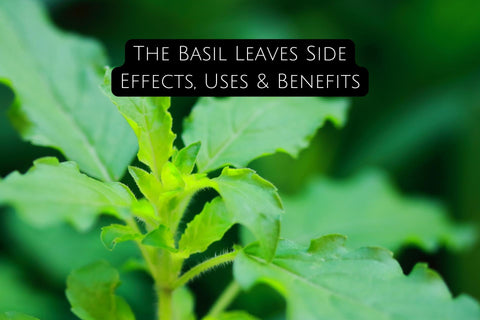Basil leaves are found in Indian households and can be used as a seasoning in various dishes or burnt at religious ceremonies. Basil is a common ingredient in many Indian recipes and can be sprinkled on crackers or popcorn for a nice flavour. Basil was brought to England from India in the 1500s and to the USA in the early 1600s. Basil leaves are best grown in countries that have warm climates like India, Madagascar, Pakistan, Haiti, Indonesia, Thailand, France, Morocco, and South Africa. The scientific name of basil plants is Ocimum basilicum L which belongs to the family Lamiaceae. The leaf's name originates from the ancient Greek word Okimon, which means smell, in Hindi and Bengali respectively.
Properties of Basil Leaves:
It may prevent cancer. It may reduce the effects of viral infections. It may fight bacteria and infections It contains antioxidants that can ease pain, swelling and even diabetes. These are just a few of the more immediate benefits to using this essential household item.
-Aromatic- Basil leaves are typically used in dishes that need a strong, pungent flavor. They can also be used to add a hint of mint or thyme to dishes.
-Medicinal- Basil leaves can help relieve heartburn, indigestion, and nausea.
-Culinary- Basil leaves are used in many different dishes from breads to pasta to salads.
-Condiment- Basil leaves can be used as a seasoning for soups, seafood, and sauces.
Potential Uses of Basil Leaves for Overall Health: 
The uses of basil leaves are:
Potential use of basil leaves for cancer: 
Scientists found aerobic and anaerobic effects of plant flavonoids, like vicenins and orientins in basil leaves. They may help against cancer by defending the cells & chromosomes against radiation and oxidative damage. Basil leaves may act against some types of cancers. For example, basil leaves have been reported to fight fibrosarcoma, skin papilloma, and oral cancers. There are numerous studies that have been performed on animals, but there are also many that should be redone. You need to see your doctor.
Potential use of basil leaves for diabetes:
A recent study suggested basil leaves had the ability to lower blood glucose levels and urine glucose levels. Since diabetics are constantly trying to keep their blood sugar in check, that could be a big plus for this plant. Basil has been shown to influence diabetes. However, more studies are required to determine the effectiveness of basil leaves. Always consult with a doctor before beginning any drastic changes or dietary changes.
Potential use of basil leaves for bacterial infections:
Basil contains several different types of essential oils. These include linalool, eugenol, citral, and limonene. Some compounds may have a bactericidal effect by disrupting bacterial cell walls and leading to the death of bacteria. It is important that you consult your doctor if you believe you may have a bacterial infection. It sounds like some of the compounds in basil leaves could stop bacteria from growing, but further studies are required to make this a scientific certainty.
Potential use of basil leaves to reduce swelling: 
Basil is used in traditional practice to help the swelling go down. It contains eugenol, which is a natural anti-inflammatory substance. When topically applied, basil essential oil can reduce inflammation and help fight against the release of mediators like nitric oxide. Research needs to be done more for the activity of basil leaf in the reducing swelling process.
Potential use of basil leaves to manage stress: 
Basil leaves may help to manage stress and can provide a relaxing activity. Follow by consuming a vegetable juice or smoothie to reduce the effects of stress. One of the many benefits of basil leaves is their ability to reduce stress due to the alleviation of oxidation. More studies are needed before we can say for sure if basil leaves can help to manage stress, however, it's important not to self-medicate if you're feeling stressed.
Potential use of basil leaves for arthritis: 
Basil leaves may reduce inflammation because of the presence of fixed oils that inhibit the substances that cause inflammation. Basil may help with supporting arthritis in rats. However, more studies are needed to see if it also helps humans. If you experience a lot of pain during any activity, it's important to consult your doctor before self-medicating. It is not possible to know how painkillers are going to affect you without the medical professional’s advice.
Potential use of basil leaves for heart health: 
Basil leaves may help to reduce high blood pressure and can even lower levels of bad cholesterol. Basil leaves are great for creating a heart healthy diet & lifestyle, by lowering triglycerides in your blood. People with too much low-density lipoprotein cholesterol and triglyceride may have a greater risk of having a heart attack, stroke, or getting atherosclerosis (abnormal buildup of plaque in the arteries). Basil leaves may help reduce the risk by slowing down platelet aggregation. Eating basil leaves may reduce the risk of heart diseases, like heart attack and stroke. They do so by lowering levels of LDL or "bad" cholesterol and triglycerides, which are responsible for hardening of the arteries. However, getting large-scale heart studies carried out is difficult right now so you should make sure to consult your doctor immediately if you experience any symptoms of heart disease.
Let us look at the health benefits of this herb below:
1) Basil is a source of essential nutrients Basil has many essential nutrients, such as potassium, calcium, and magnesium. Specifically, the leaves are rich in beta-carotene and vitamin C. Vitamin A is also present in basil leaves to a small extent.
2) Basil can relieve pain from aches and pains, Basil has anti-inflammatory and pain-relieving properties. A study found that basil can help in reducing joint swelling as well as inflammation. Basil is also a great source of flavonoids, which serve to reduce the risk of cancer by preventing cells from becoming overly proliferation.
3) Basil has antibacterial properties Basil is an antioxidant and antispasmodic that fights against bacteria, viruses, and fungi. Mixing basil with honey can be a natural way to fight off bad bacteria in the body.
How to Use Basil Leaves? 
Basil has a multitude of uses and can complement various food items. It ranges from condiments like it's commonly used in sauces to vegetables, soups, fish & meat. Basil is versatile and can be mixed with other herbs and spices to add flavor to your main dishes.
Basil leaves can be part of tea or cheese. You can use essential oils in basil to make beverages and prepared foods.
Side Effects of Basil Leaves: 
Basil Leaf is a natural supplement with no side effects when used in normal quantities. However, if any side effects are noted with its supplement use, you must see your doctor as soon as possible. You must consult your ayurvedic physician, who has prescribed and monitored you for any potential problems.
Precautions to Take with Basil Leaves: 
Basil leaves are meant to be consumed, but you must make sure that you are taking the proper precautions before doing so. The safest way to do this is by consuming basil leaves in some sort of liquid. Some other types of consumption include basil oil or drying them out.
Basil leaves contain a potential carcinogenic substance called esztergoline. They're not recommended to be consumed during pregnancy or breastfeeding. Basil should be avoided if you are currently on treatment for medical condition. A doctor would know best when to allow ingestion of basil leaves, in addition to being screened by a physician before beginning your regimen.




Comments (0)
There are no comments for this article. Be the first one to leave a message!